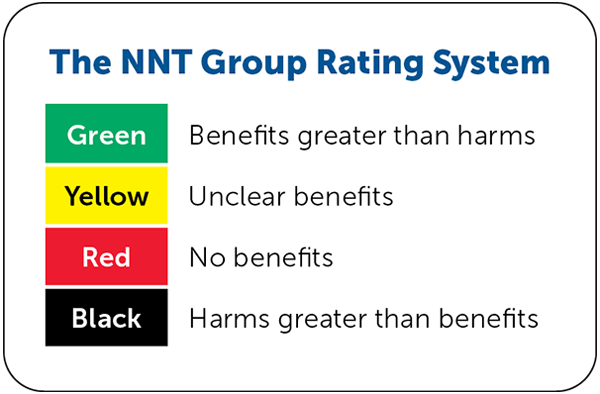
Am Fam Physician. 2020;102(1):online
Author disclosure: No relevant financial affiliations.

Details for This Review
Study Population: Adults taking vitamin D supplements
Efficacy End Points: Decrease in all-cause mortality, cancer mortality, or cardiovascular mortality
Harm End Points: None

| Benefits | Harms |
|---|---|
| 1 in 274 did not die from cancer over a period of 1.2 years | Not evaluated |
| No deaths from all causes were prevented | |
| No cardiovascular deaths were prevented |
Narrative: Vitamin D supplementation has been a topic of debate for many years. Vitamin D is essential to skeletal health and may also have other extraskeletal benefits. Observational studies have shown that those with low vitamin D levels have higher cancer and cardiovascular mortality. There is ongoing research to determine if vitamin D plays a role in decreasing all-cause mortality. Previous systematic reviews and meta-analyses have shown that oral vitamin D therapy was associated with small decreases in all-cause mortality. Recent trials with double the number of participants have shown no benefit of vitamin D supplementation on mortality.
This meta-analysis reviewed the effectiveness of vitamin D to reduce all-cause mortality, cancer mortality, cardiovascular mortality, noncancer or noncardiovascular mortality, cerebrovascular mortality, and ischemic heart disease mortality.1 It included 52 randomized controlled trials published before December 26, 2018 with a total of 75,454 participants. Intention-to-treat analysis was conducted to evaluate outcomes. Subgroup analyses were performed for dose (at least 2,000 IU per day and less than 2,000 IU per day), type of vitamin D (vitamin D2 and vitamin D3), timing of treatment (daily and intermittent), baseline serum 25-hydroxyvitamin D level (at least 20 ng per mL [49.92 nmol per L] and less than 20 ng per mL), and mean age at least 70 years and younger than 70 years). Retrospective subgroup analyses were also performed based on length of follow-up (at least three years and less than three years), year of publication (before 2014 or in/after 2014), sex (female and both sexes), residential status (community and institution), bolus (yes and no), intervention (vitamin D and vitamin D with calcium), and latitude (at least 40 degrees and less than 40 degrees).
For the primary outcome of all-cause mortality, there was no statistically significant difference between the vitamin D supplementation group and the control group (risk ratio = 0.98; 95% CI, 0.95 to 1.02). Several analyses showed a lack of publication bias or small group effect.
For the secondary outcomes of other mortality, the study found that vitamin D supplementation was associated with significant reduction in risk of cancer mortality (risk ratio = 0.84; 95% CI, 0.74 to 0.95; absolute risk reduction = 0.004; number needed to treat = 250). The study found no significant difference between groups in cardiovascular mortality, noncancer or noncardiovascular mortality, cerebrovascular mortality, or ischemic heart mortality.
Caveats: Vitamin D2 and vitamin D3 have differing effects in raising 25-hydroxy vitamin D levels. Most intervention trials comparing both have shown that vitamin D3 increased 25-hydroxyvitamin D levels more efficiently. Subgroup analyses found that all-cause mortality was significantly lower with vitamin D3 supplementation than vitamin D2 (P for interaction = .04). Similarly, vitamin D3 also reduced the risk of cancer mortality, but vitamin D2 did not (P for interaction = .11). Because subgroup analyses are observational by nature and not randomized comparisons, this effect on all-cause mortality requires additional evidence gathered by future large randomized controlled trials.
According to subgroup analysis, all-cause mortality was significantly lower in trials with longer follow-up (more than three years). Therefore, the length of vitamin D supplementation could affect the results on all-cause mortality.
In summary, high-quality evidence suggests that vitamin D supplementation does not decrease all-cause mortality, cardiovascular mortality, ischemic heart disease mortality, noncancer or noncardiovascular mortality, but it does decrease the risk of cancer mortality (number needed to treat = 274 for 1.2 years).
Copyright © 2020 MD Aware, LLC (theNNT.com). Used with permission.
This series is coordinated by Dean A. Seehusen, MD, MPH, AFP assistant medical editor, and Daniel Runde, MD, from the NNT Group.
A collection of Medicine by the Numbers published in AFP is available at https://www.aafp.org/afp/mbtn.
